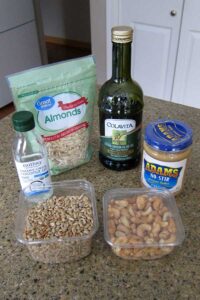Fats (a.k.a. lipids) are organic substances that are not soluble in water. They win the prize for the most energy dense macronutrient. Whereas protein and carbohydrates deliver 4 calories per gram, fats serve up 9 calories per gram. For this reason, many diets argue for severely restricting (or eliminating) fats from the daily meal plan to speed weight loss. Beyond the challenge of sustaining a fat-free diet, such constraints ignore the essential work that fats do for our bodies. They serve as:
- Building blocks for cell membranes as well as several hormones and hormone-like substances
- Nutrient sources for brain development
- Thermal insulation for vital organs
- Carriers for fat-soluble vitamins (A, D, E, and K)
- Appetite suppressors by slowing digestion and conferring a sense of fullness
When folks consume too little fat, they may experience low energy, difficulty concentrating, depression, weight gain, and mineral deficiencies. They may also wonder why their food doesn’t taste very good!
Saturated fats show all available carbon bonds filled by hydrogen atoms; there are no double carbon bonds. They are solid or semi-solid at room temperature – e.g., animal fats, cheese, coconut oil, palm oil. Saturated fats form 50% of cell membranes, support calcium absorption into bones, protect the liver from toxins, enhance immune function, and provide an antimicrobial shield around the heart. They’re the most stable fat; they don’t go rancid even when used at high heat for cooking. The body can make them from available carbohydrates if they’re not included in the diet.
Monosaturated fats have one double-bond of carbon atoms. They are liquid at room temperature and relatively stable. They’re found in olive oil as well as almonds, peanuts, pecans, cashews, and avocados. They are considered heart-healthy fats when used in moderation. The body can make them from saturated fats if they’re not included in the diet.
Polyunsaturated fats have two or more double carbon bonds – e.g., omega-3 and omega-6. The body cannot make these fats; they must be obtained from foods. We need omega-3 fats to produce hormone-like compounds called prostaglandins which play a role in reproduction as well as resolving inflammation. They’re found in oils of cold water fish (e.g., herring, shell fish, sardines) and flaxseeds. Omega-6 fatty acids are found in vegetable oils (e.g., corn, safflower, sunflower) and support proper functioning of cells. Polyunsaturated fats are fragile in that they tend to become oxidized or rancid when subject to heat, air, light, and/or moisture. That’s why they’re packaged in dark bottles and may require refrigeration. When they’ve gone bad, they become extremely reactive chemically and may cause damage to cell membranes, blood vessels, and red blood cells.
Trans fats are unsaturated fats that have been hydrogenated artificially to preserve shelf life and sustain high temperatures in commercial fryers. They’re also inexpensive. Unfortunately, they raise bad (LDL) cholesterol levels and lower good (HDL) cholesterol levels. Eating trans fats increases the risk of developing heart disease, stroke, and type 2 diabetes.
Most fat in the body takes the form of triglycerides – i.e., three fatty-acid chains attached to a glycerol molecule. While elevated triglycerides are a risk factor for heart disease, they don’t come from food directly. We make them in the liver as a function of excess sugars that have not been used for energy.
Cholesterol has been characterized as a lipid even though it does not contain a fatty acid. It gives cell membranes stiffness and stability and is essential for corticosteroids (stress hormones), sex hormones, bile salts, and serotonin receptors. There’s no dietary requirement to consume cholesterol because the body can make all that it needs. Ingesting dietary sources of cholesterol may not raise blood serum cholesterol (although excess consumption is hardly recommended!) Elevated serum cholesterol may be associated with a thyroid condition or the presence of high levels of altered, free radical-containing fats from which cholesterol serves a protective function.
Nutritionist Roberta Anding suggests that a prudent diet contains no more than 30% dietary fat of which 70-80% is unsaturated. Eating plans with < 20% dietary fat have been associated with lower rates of cancer and cardiovascular disease. She advises that we be careful with eating fish due to mercury contamination. Above all, eliminate processed or deep-fried foods containing trans fats or free-radical-containing unsaturated oils as they’re more likely to behave like marauders than nutrients.
